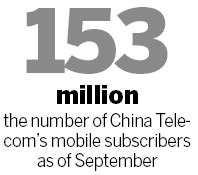
Nation's biggest fixed-line carrier takes hit from heavy subsidies on smartphones

China Telecom Corp Ltd, the nation's smallest mobile carrier by subscribers, reported a net profit drop of 8 percent in the first three quarters, largely due to heavy subsidies on smartphones such as Apple Inc's iPhone handsets.
The company, which is also China's biggest fixed-line carrier, said on Monday that its net income in the third quarter fell to 3.75 billion yuan ($601 million), from around 4.05 billion yuan a year earlier. China Telecom's sales rose 16 percent to 72 billion yuan in the quarter.
For the first three quarters that ended Sept 30, China Telecom logged a net profit of 12.6 billion yuan, down 8 percent from the same period last year. Its operating revenue increased 15.1 percent to 210 billion yuan in the first nine months.
China Telecom saw a rapid increase in mobile customers and revenue thanks to its aggressive strategies for the wireless business, analysts said. The company offered subsidy plans for mobile phones, including the iPhone 4S, to attract more 3G network service users.
"Following the launch of iPhone to expand the high-end market during the period, the group made an appropriate increase in marketing initiatives," Wang Xiaochu, chairman and chief executive officer of China Telecom, said in a statement on Monday, without elaborating.
Revenue from sales of mobile terminals was 18.4 billion yuan in the first three quarters, an increase of 82.5 percent from the same period last year, the company said.
China Telecom added 26 million new mobile subscribers in the first three quarters, giving it a total user base of 153 million. Of these, around 60 million, or 39 percent, were 3G subscribers.
The figure also showed that China Telecom has a higher 3G penetration rate than its domestic rivals. For example, China Mobile Ltd, China's biggest telecom operator, had 698.5 million mobile subscribers by September, while only 75.6 million were 3G users.
As a result of the rapid rise in mobile service revenue, other operating expenses increased too.
"CDMA network capacity lease fees increased significantly, leading to the growth rate of network operations and support expenses being higher than the revenue growth rate," Wang added.
Ricky Lai, a telecom analyst at Guotai Junan Securities, said China Telecom's business model could be improved in 2013 with the reduction of network-leasing expenses due to the increasing 3G use rate.
"China Telecom will acquire the CDMA network from its parent company at the end of 2012, at a lower-than-expected acquisition cost of 84.6 billion yuan," Lai wrote in a research note.
In addition, an increased number of iPhone user will be good for China Telecom's average mobile service revenue per user per month - also known as ARPU - in the long run, since the ARPU value of one iPhone user is about three to four times that of an ordinary mobile phone user, according to a report from Nomura Securities Co Ltd.
Chinese media reported that China Telecom will introduce the iPhone 5, the latest Apple handset model, in December. China Telecom started offering network services for Apple's iPhone handsets in March. It is the second Chinese telecom operator to introduce Apple's iPhone series on contract, after China Unicom (Hong Kong) Ltd.
shenjingting@chinadaily.com.cn